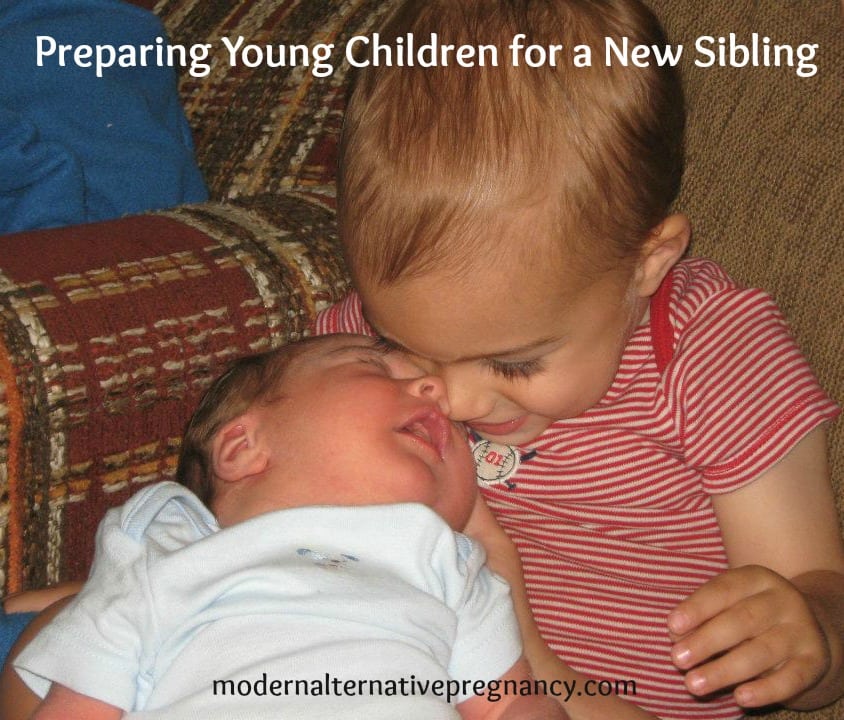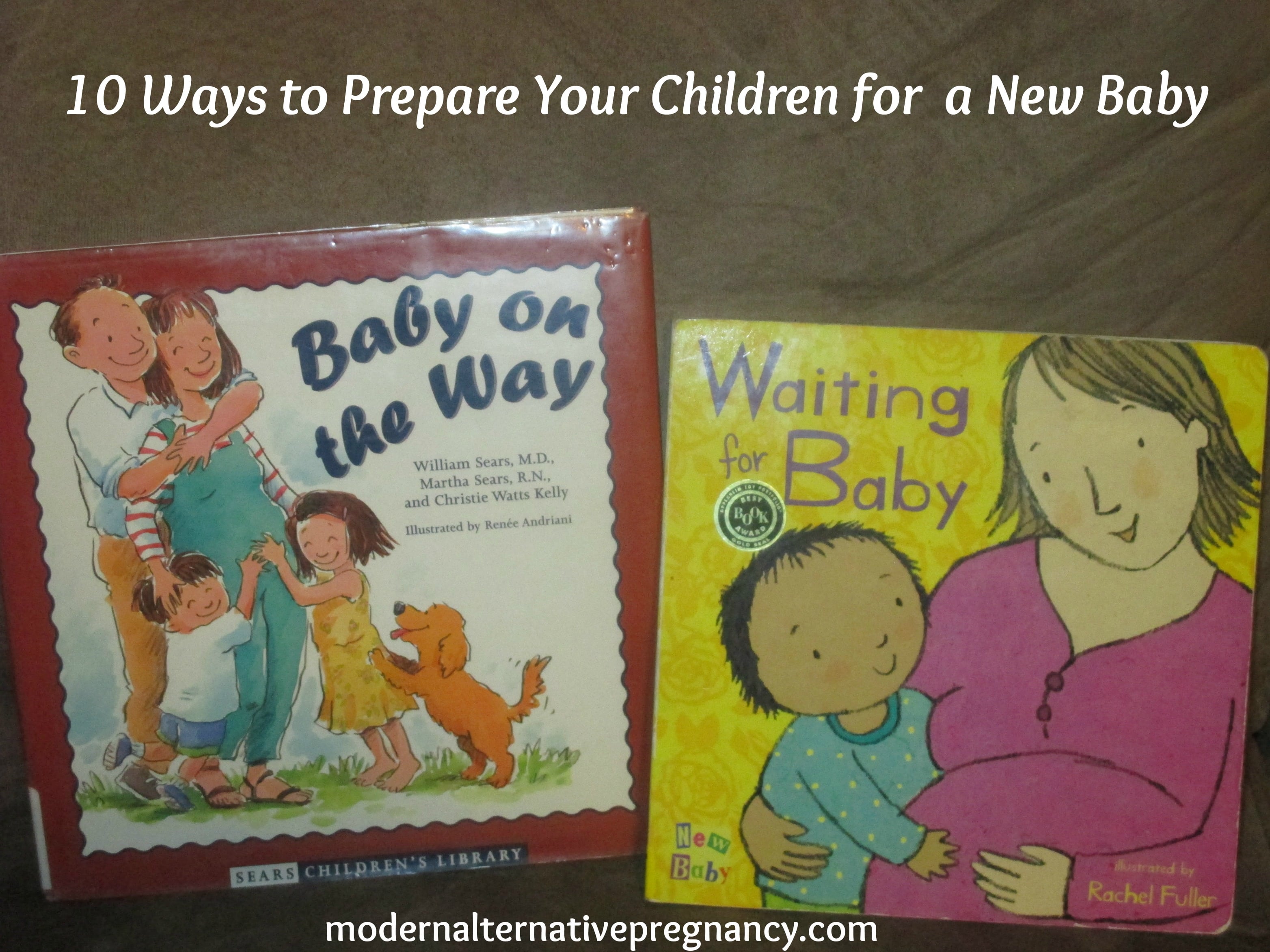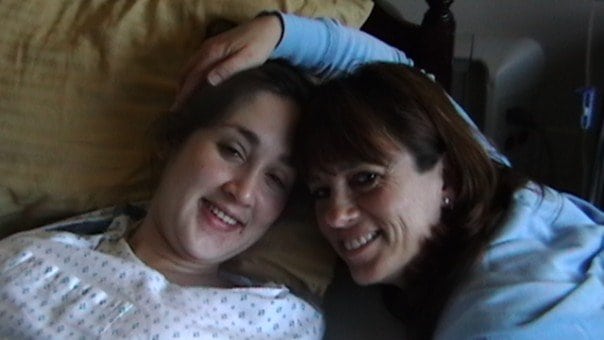By Amy Wood, Contributing Writer
When parents are expecting their first baby they usually only have themselves to prepare, but when the second baby — or the fifth baby, as was the case in our home recently — is on the way, there are more people to prepare.
Certainly this will be a new experience for your child if they are currently the youngest or the only child (or even an older child who can’t remember a lot about when other younger siblings were born). Some things you can’t fully understand until you actually experience it, but even a toddler can understand so much more than he or she can verbalize and there are several things you can do throughout your pregnancy to prepare your child or children for a new sibling.
Here’s what we did recently to prepare our 6, 5, 3, and 2 year olds for the arrival of their new baby brother.
10 Ways to Prepare Your Children for a New Baby
1. Talk openly about the new baby throughout your pregnancy!
Bring the new baby into everyday conversation as it naturally fits and talk about the baby as if he or she is already part of the family.
- “Next year the baby will be with us on vacation!”
- “Do you think the baby will like to play with cars like you do?”
- “The baby will love listening to you talk about animals when he’s born!”
- “Did you know the baby can hear us now? I think he is enjoying hearing this book we are reading!”
Last year we even hung a stocking for the baby and opened it for him on St. Nicholas Day. Being pregnant is an abstract concept for a young child so these kind of things can help a child begin to understand the coming baby as a real person.
2. Share with your children about your prenatal appointments and the baby’s development
You could also bring them along to your prenatal appointments if it seems appropriate to you. Your care provider may even include your child in your care, such as helping to measure your fundal height or check for the baby’s heartbeat. Also, invite your children to feel the baby moving once they are able to — what an amazing moment to share!
Note from Kate: Late in my last pregnancy, my kids liked to pull my shirt up to watch the baby kick and squirm inside my belly. They could see my belly jumping all over! This helped it feel more real to them, to “see” the baby.
3. Talk honestly about what life will be like when the baby is born.
I think honesty is the best policy with all people, including children. There will be many wonderful things about having a new baby in the home, but there will be some challenges as well. Newborns have needs that may seem overwhelming at first and they need almost constant contact with their main caregivers which are usually mom and dad. You can discuss these things with your children and also assure them that their needs will still be met as well because you are a family that works together to make sure that everyone’s needs are cared for.
- “I’m going to have to rest a lot after the baby is born so we may not be able to go to the zoo as often as we like to, but we can make a list of movies to reserve from the library so that we can still have something fun to do together during the time we have to stay at home.”
- “The baby is going to need to nurse a lot so let’s make a list of the things you can do while I am sitting down nursing the baby.”
- “I might have to hold the baby a lot, but I can still play board games with you or read books to you while I do that.”
- “Yes, the baby might try to get into your things once he can crawl, but we can make sure to keep your things safe in your bedroom and close the door to keep the baby out.”
4. Discuss with your kids how they will be cared for while you are away
This is important if you are planning a hospital birth. Make note of anything they want their caregivers to know about their normal routines or any other aspect of caring for them when you aren’t there.
5. Ask for their thoughts on what name to give the baby (if no name has been chosen yet) — and honestly consider them
I’m certainly not going to name my baby John Doolittle, MD or a name that already belongs to one of my other children — both of which came among the suggestions from my kids this time around. They enjoyed coming up with names though, and we did seriously consider the ones which could be seriously considered 🙂
Note from Kate: My then almost-4-year-old suggested we name our baby Chocolate. It was really cute.
You might think that your child is too young to understand much about your pregnancy or a new baby, but please don’t underestimate what even a young child is capable of understanding.
I will never forget the day that my oldest heard his younger brother cry out (through the monitor) during a nap and he immediately ran to get a beloved toy, held it up to the monitor, and looked up at me as if to say that I needed to take this toy to the baby to help him calm down. He’s only 12 months older than his brother, who couldn’t have been more than a few months old at the time — yet he understood so much more about this new baby in our home than he ever could have verbalized.
Even if your child is very young you never know what they will internalize or when they will come to understand so it’s best to continue discussing these things and involving your child as much as he or she willing.
6. Remember to accept and validate your child’s feelings about having a new baby
Your child’s feelings about having a new sibling may range from happiness to feeling stressed or perhaps not even wanting a new baby around. They may go through all of these emotions in one day. Feelings can be fleeting and rather than showing disapproval for what they might be feeling if it is negative attitude, simply validate their feelings and show that you understand by repeating back what they have said or explaining what you see.
Instead of responding with “don’t say that you don’t want us to have a baby, you’re going to love having a little brother or sister, just wait and see!” or “there’s nothing to be upset about, a new baby will be so fun, you’re so lucky to have a brother or sister!”, say “you feel upset about having a new baby. Yes, I can see how big changes like this can be difficult” and go from there.
We have not necessarily dealt with this kind of attitude within our family, but if this continued to come up I would dig deeper to try to determine why the child feels this way. Perhaps they are concerned that a baby would mess up their toys or some other issue where you can help alleviate their concerns through more explanation.
Remember that issues that seem insignificant to us can seem very BIG to a young child. Also remember that your child likely did not ask to have a sibling (or 4 siblings, etc.) and didn’t choose to be part of a family of your size, whatever that may be. All of these things are outside of their control and they may have a lot of different feelings about it all and they need a safe place to express them and work through them.
7. Share memories of when your older children were babies
A great way to help your children understand what a baby will be like and help them to still feel important and loved at the same time is to share with them about what they were like when they were babies.
Show them their baby pictures and reminisce about when they were babies. You can talk about the normal baby things that they did, like nursing and learning to crawl and being carried around in a wrap. They will also enjoy the funny stories- like how they pooped all across your bed when they were a newborn or how you left them alone for a few minutes only to come back and realize that they had suddenly figured out how to move across the floor and had strewn a large basket of toys all over the dining room!
If you have more than one child you can tell them about what it was like when you brought them home to their sibling(s) or how they reacted to their new sibling’s arrival.
8. Read books about being a big brother or sister and what it’s like having a new baby
This is how we shared with our sons that we were expecting another baby this time. I found some great books through our local library system and although they didn’t quite get it at first once we explained why we had chosen these specific books they were very interested and wanted to read the books many times over the next few weeks.
We chose a mix of longer and shorter picture books and also board books to appeal to all of our children. I highly recommend “Baby on the Way” by William and Martha Sears.
9. Include your children in preparing for the baby’s arrival in hands-on ways
There are many ways in which young children can help prepare for a new baby, and of course these are all opportunities for continuing discussion about the baby, what a baby needs, and even how all family members can help take care of these needs. Here are a few ideas of areas where your children can help you prepare for the baby’s needs:
- Getting out the baby’s clothes, blankets, and other items
- Organizing the baby’s room or sleeping space or other areas throughout the house
- Helping to choose any new things that need to be purchased
- Prepping cloth diapers
10. Help each child choose a special item, that represents something about themselves, to give to the baby when he or she is born
This idea came to me when I was in a thrift store and saw a receiving blanket with birds on it that made me think of one of my sons who is a bird lover. He wouldn’t need such a blanket, but I thought it would be sweet if he gave the blanket to the baby, since it represented something about who he is and would also be a gesture of love to his new sibling. When I brought it home and explained this idea to him his eyes lit up and he was so proud that he had something special to give to the baby — and that it had birds on it. It was just something special he could share with the baby and help them bond immediately.
I found an item like this for all of my other sons: a hat with animals on it to be from my son who always wears a hat and also loves animals, the responsibility of bringing the proper outfit to the hospital (we had one boy and one girl outfit chosen) was given to my oldest son, and a small stuffed animal for my son who loves stuffed animals to give to the baby. They all loved this and constantly checked the shelf in my room where I kept these things to make sure they were there and ready for when the baby would be born.
It ended up being a really special moment when they all gave these things to their baby brother after he was born, and I will share more about that later this month!
Taking the time beforehand to prepare your children for their new sibling can help to ease the transition when the baby arrives and also set your children up for healthy sibling relationships throughout their lives.








My family members every time say that I am wasting my time here at
web, however I know I am getting familiarity all
the time by reading such good posts.
[…] this month I shared about how we prepared our four young children (ages 2-6) for the arrival of their baby brother, but what about once the baby is actually here? […]